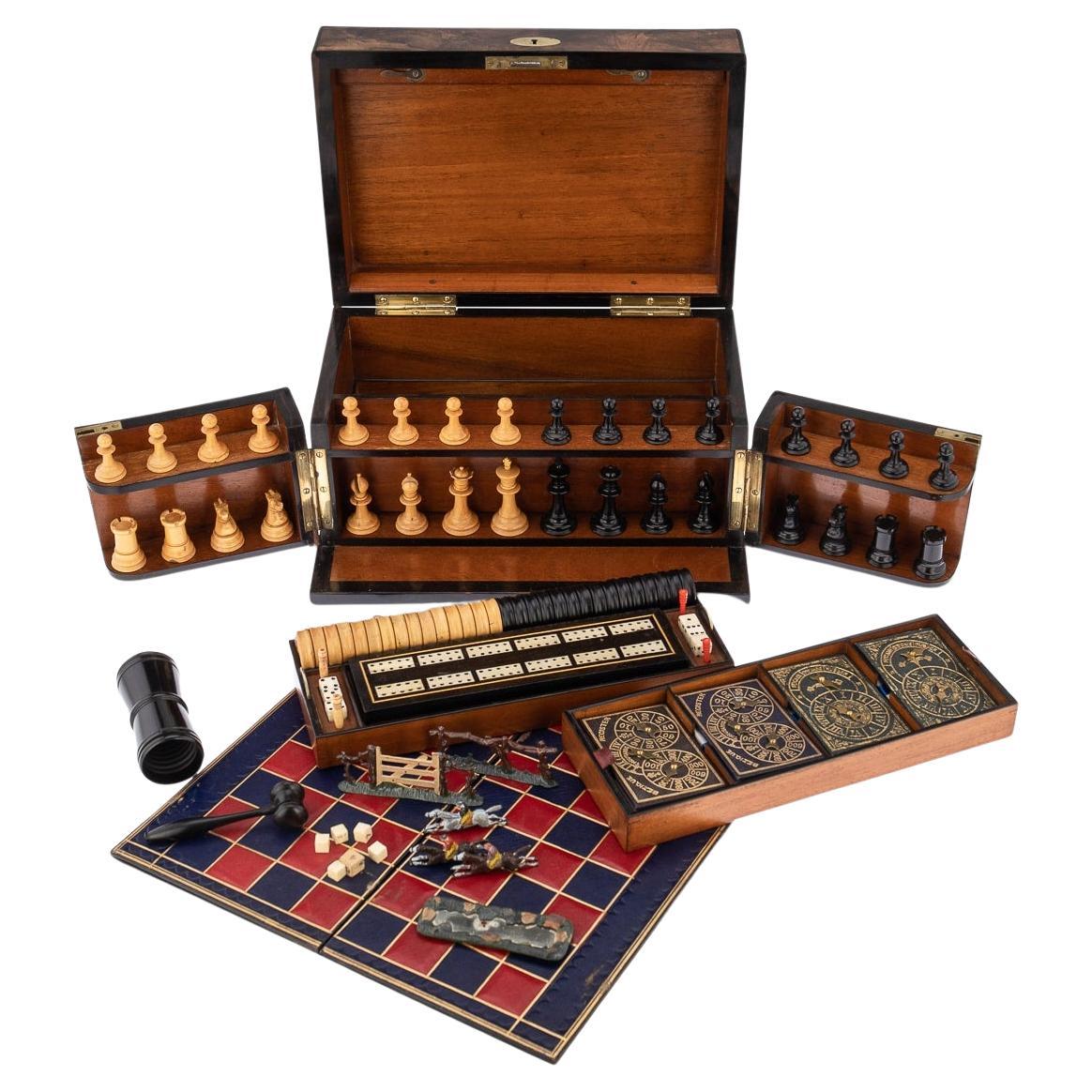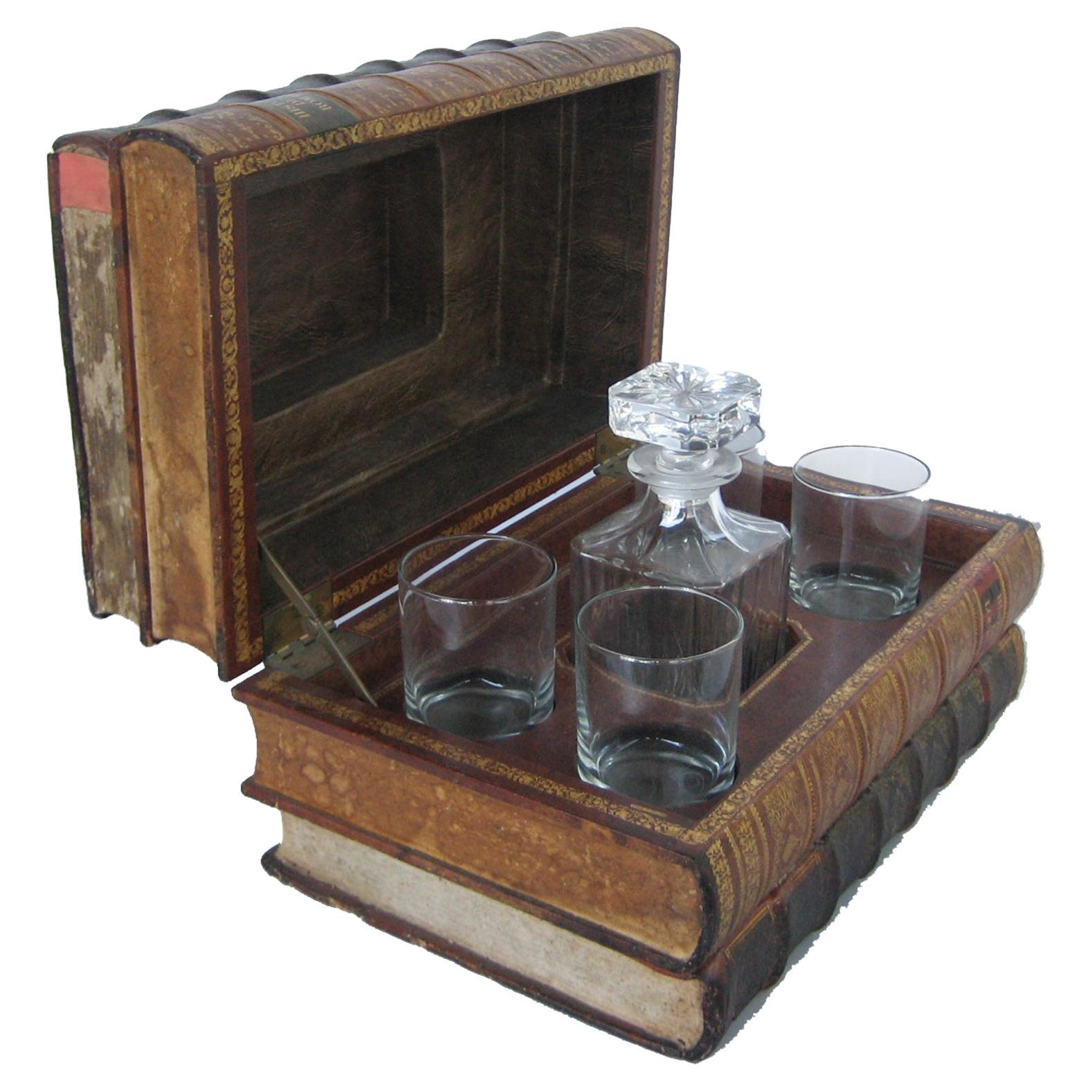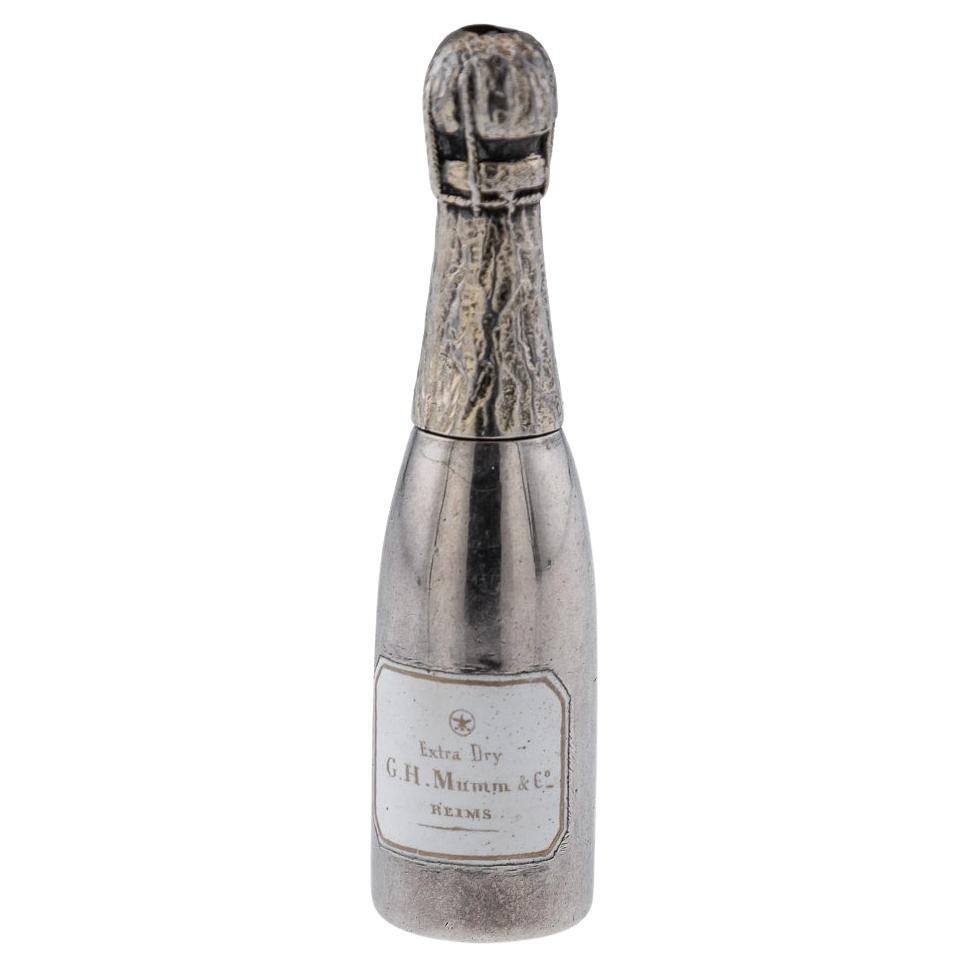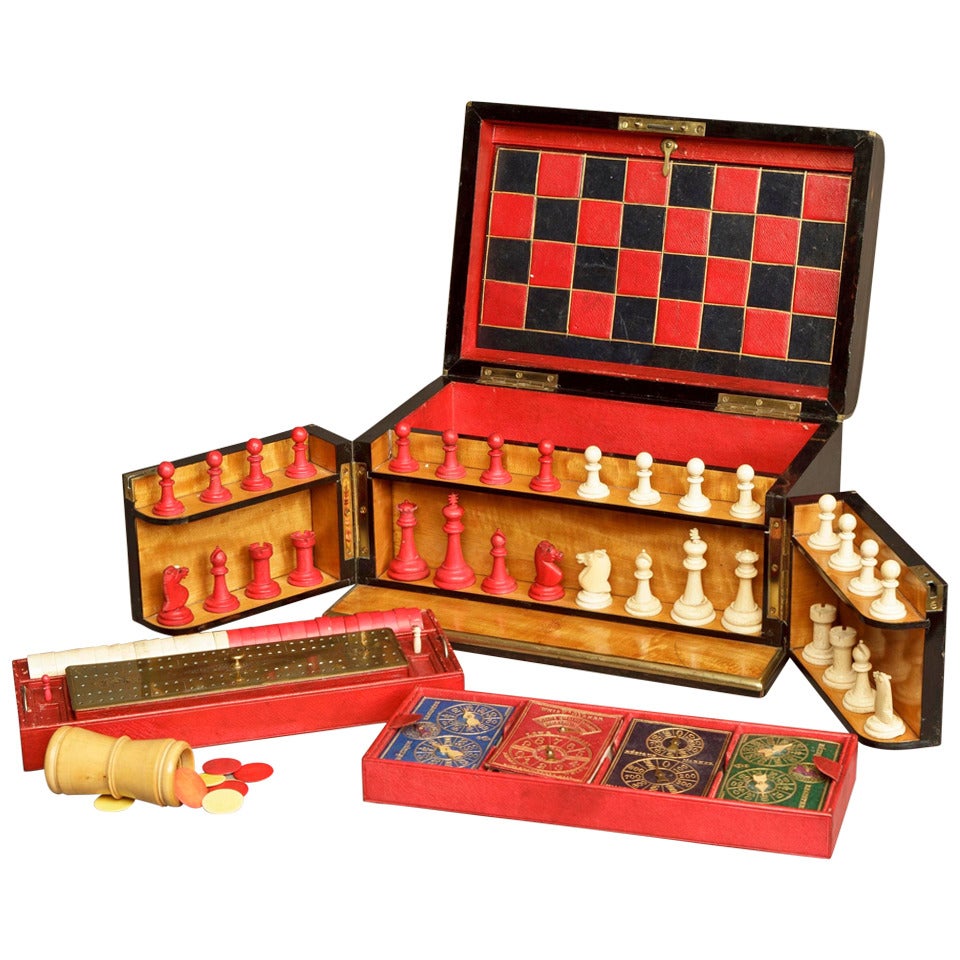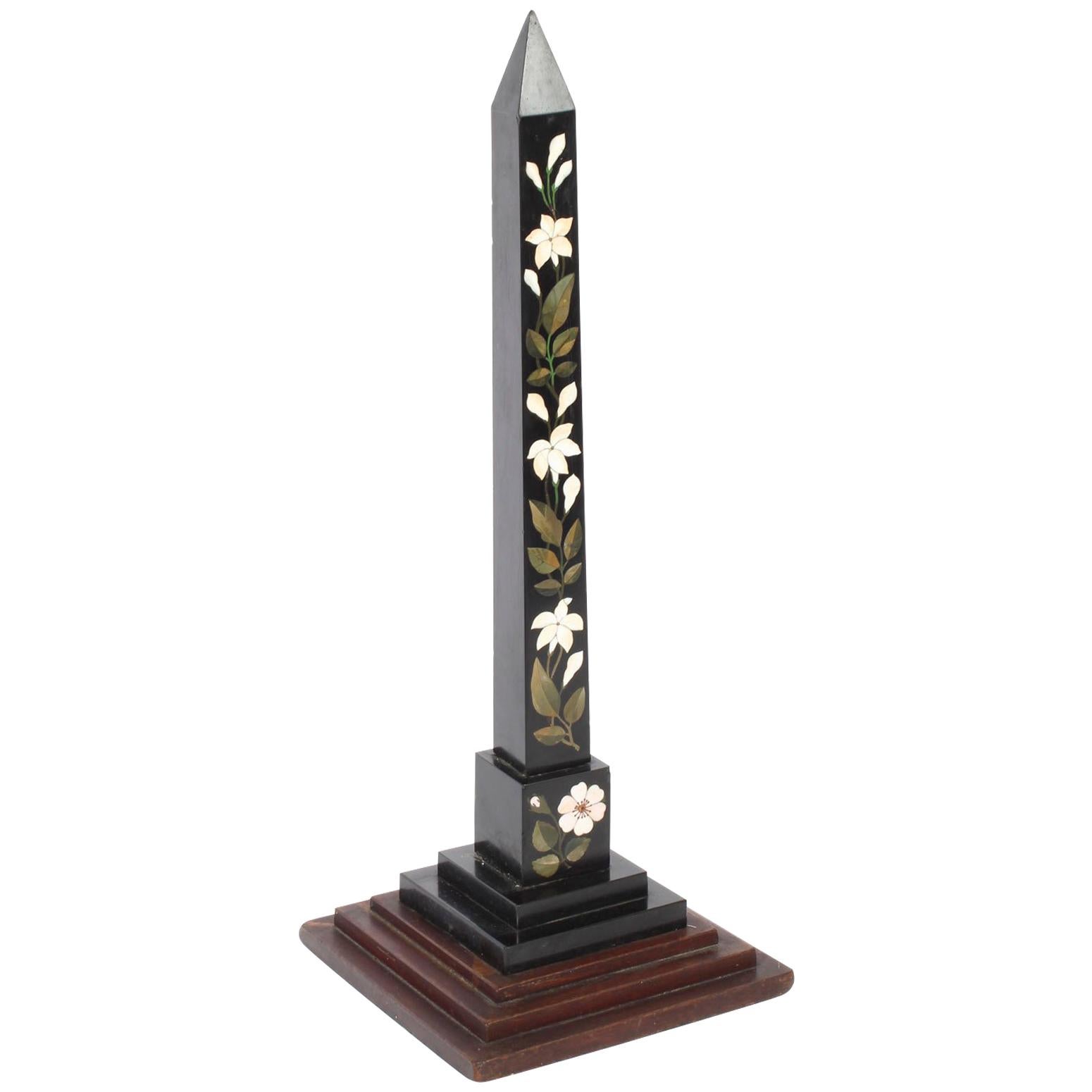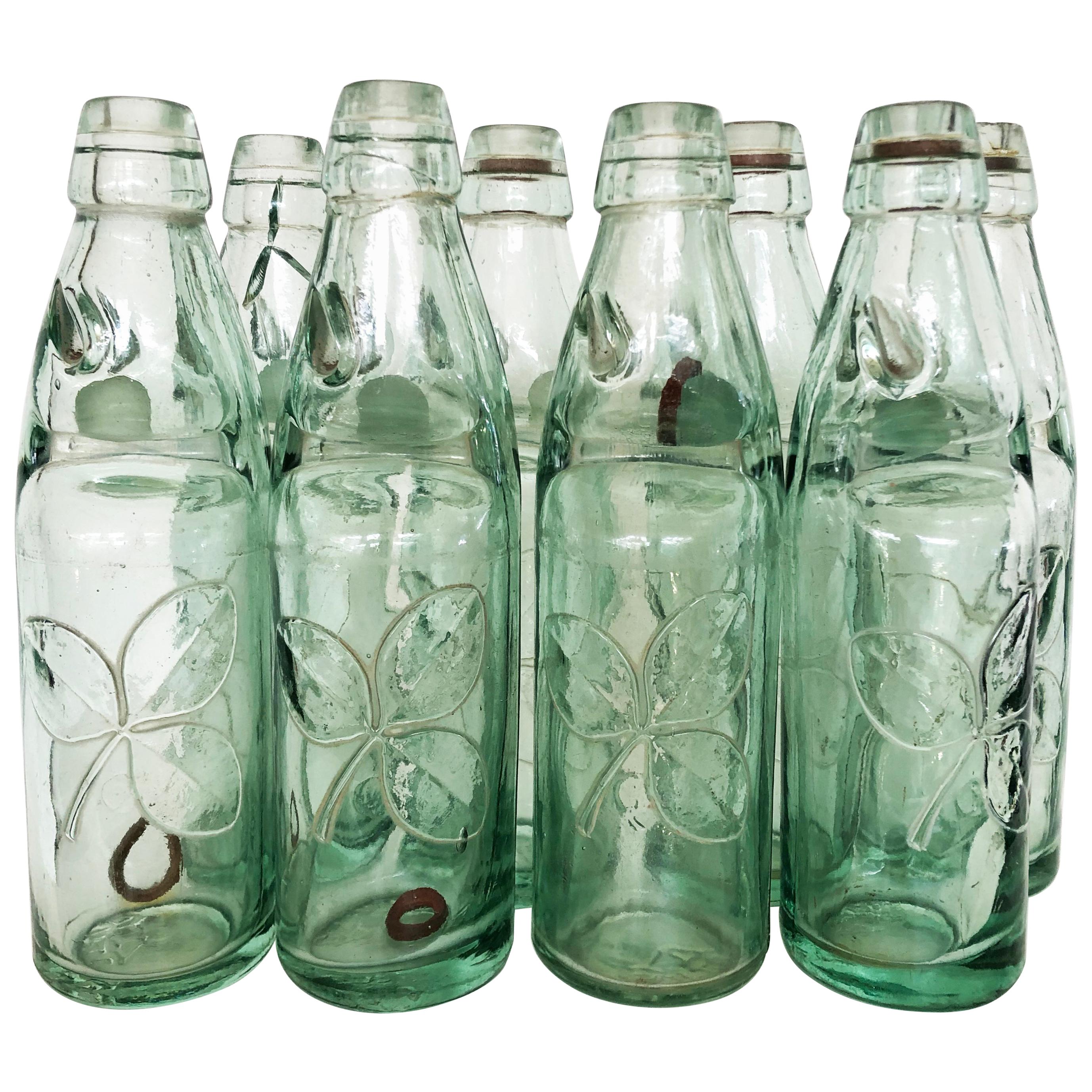Items Similar to Antique Victorian Three Bottle Tantalus & Games Compendium 19th C
Want more images or videos?
Request additional images or videos from the seller
1 of 21
Antique Victorian Three Bottle Tantalus & Games Compendium 19th C
About the Item
This is a fabulous antique Victorian games compendium and tantalus, circa 1880 in date.
It consists of three cut crystal liquor bottles with stoppers, a pair of engraved shot glasses, a silver plated tray and a fitted cribbage board, all housed in a magnificent mahogany casket with inlaid decoration and satinwood and boxwood line inlay. The interior is lined with a bevelled mirro and it is accented with silver plated handles and details .
When you open the tantalus a sprung section pops out, it contains two packs of playing cards and a pair of dice and the markers for the cribbage board. Above this are three silver plated coasters.
The fold down section is fitted with a useful silver plated serving tray above a drawer containing a set of dominoes and more playing cards.
It is fitted with the original working high quality lock complete with key.
Condition:
In really excellent condition having been beautifully cleaned, polished and waxed in our workshops, please see photos for confirmation.
Dimensions in cm:
Height 35 cm x Width 37 cm x Depth 27 cm
Dimensions in inches:
Height 1 foot, 2 inches x Width 1 foot, 3 inches x Depth 11 inches
Tantalus
is a type of liquor decanter in which the bottle stoppers are locked down tightly by a metal bar. This was to prevent the theft of the contents by servants. Like the name suggests, the decanters themselves are visible, drawing temptation while unattainable. A key is required for entry.
The most common types of tantalus holds three bottles or decanters while there are also smaller types housing only two. There are many different forms of tantalus. Often the encasement has metal handles on both sides and ornately carved decor. Crystal and metal versions are also a beautiful option when choosing a tantalus.
Tantalus derived its name from the story of the mythological Greek king, Tantalus, mortal son of Zeus and Pluto. To be tantalized is to be tempted with the unattainable, and the king was sorely tested. He was condemned to an eternity in Hades for angering the Gods and was forced to stand forever in water that, when he bent to drink, would recede and to gaze upon foods he could only reach for and never grasp.
The 1800s saw our Victorian predecessors apply the King’s name to the lockable decanter.
Bramah
is London's oldest security company. Established at 124 Piccadilly, London in 1784, and today based in Marylebone, London and Romford, Essex.
Bramah made their first lock in 1784 and the patent was awarded in 1787. The designer was Joseph Bramah. Joseph Bramah was a leading inventor of the industrial revolution, patenting over 18 new ideas, including a new valve for the water closet (toilet), the hydraulic pump, a fountain pen, and a fire engine.
Bramah also introduced a beer hand pump for use at the bar, to prevent fluid loss when barmen went downstairs to pour a new jug! Due to the quality of his manufacturing, his name became a by-word amongst British Engineers for engineering excellence and many of his inventions are on display in the Science Museum in London. You can find one of his original toilets still working in Osborne House, Queen Victoria's home on the Isle of Wight.
The Bramah lock was unique and advanced property and valuables protection enormously. Indeed it was 50 years ahead of any Chubb lock and 70 years ahead of Yale. Original Bramah locks are most often found on the highest quality homes and furniture.
Cribbage, or crib, is a card game traditionally for two players, but commonly played with three, four or more, that involves playing and grouping cards in combinations which gain points. Cribbage has several distinctive features: the cribbage board used for score-keeping, the eponymous crib or box (a separate hand counting for the dealer), two distinct scoring stages (the play and the show) and a unique scoring system including points for groups of cards that total fifteen.
Mahogany
is probably one of the largest ‘families’ of hardwood, having many different varieties within its own species.
Mahogany has been used for centuries in ship building, house building, furniture making etc and is the core structure of just about every 19th century vanity box, dressing case or jewellery box. It became more of a Victorian trend to dress Mahogany with these decorative veneers, such as Rosewood, Kingwood, Burr Walnut and Coromandel, so that the actual Mahogany was almost hidden from view.
Mahogany itself is a rich reddish brown wood that can range from being plain in appearance to something that is so vibrant, figured and almost three dimensional in effect.
Although Mahogany was most often used in its solid form, it also provided some beautifully figured varieties of veneer like ‘Flame’ Mahogany and ‘Fiddleback’ Mahogany (named after its preferred use in the manufacture of fine musical instruments).
Cuban Mahogany was so sought after, that by the late 1850′s, this particular variety became all but extinct.
Our reference: A3783
- Dimensions:Height: 13.78 in (35 cm)Width: 14.57 in (37 cm)Depth: 10.63 in (27 cm)
- Sold As:Set of 13
- Materials and Techniques:
- Period:
- Date of Manufacture:circa 1880
- Condition:
- Seller Location:London, GB
- Reference Number:
About the Seller
5.0
Platinum Seller
These expertly vetted sellers are 1stDibs' most experienced sellers and are rated highest by our customers.
Established in 1983
1stDibs seller since 2012
1,199 sales on 1stDibs
Typical response time: <1 hour
Associations
LAPADA - The Association of Arts & Antiques Dealers
- ShippingRetrieving quote...Ships From: London, United Kingdom
- Return PolicyA return for this item may be initiated within 14 days of delivery.
More From This SellerView All
- Antique Coromandel Three Crystal Decanter Tantalus & Games Drawer 19th CLocated in London, GBThis is a superb antique Victorian coromandel, brass mounted and cased three decanter tantalus and games compendium, Circa 1880 in date. It was skillfully crafted in rare coromandel with cut brass mounts, three cut crystal glass decanters with stoppers, a mirrored back and a twin lidded compartment with a Bramah lock, opening to reveal a compartment containing five glasses. There is a secret base drawer with playing cards, cribbage board, dice and chips. It can be opened by pressing the disguised brass button which is just in front of the central decanter. It is a decorative piece which is also very practical, and would make a lovely gift. It is complete with the original working Bramah lock and key, which locks everything. Condition: In excellent condition having been beautifully cleaned polished and waxed in our workshops, please see photos for confirmation. Dimensions in cm: Height 33 cm x Width 38 cm x Depth 11 cm Dimensions in inches: Height 1 foot, 1 inch x Width 1 foot, 3 inches x Depth 4 inches Coromandel wood or Calamander wood is a valuable wood from India, Sri Lanka and South East Asia. It is of a hazel-brown color, with black stripes (or the other way about), very heavy and hard. It is also known as Macassar Ebony or variegated ebony and is closely related to genuine ebony, but is obtained from different species in the same genus; one of these is Diospyros quaesita Thwaites, from Sri Lanka. The name Calamander comes from the local sinhalese name, 'kalu-medhiriya', which means dark chamber; referring to the characteristic ebony black wood. Coromandel wood has been logged to extinction over the last 2 to 3 hundred years and is no longer available for new work in any quantity. Furniture in coromandel is so expensive and so well looked after that even recycling it is an unlikely source. A substitute, Macassar Ebony, has similar characteristics and to the untrained eye is nearly the same but it lacks the depth of colour seen in genuine Coromandel. Bramah is London's oldest security company. Established at 124 Piccadilly, London in 1784, and today based in Marylebone, London and Romford, Essex. Bramah made their first lock in 1784 and the patent was awarded in 1787. The designer was Joseph Bramah. Joseph Bramah was a leading inventor of the industrial revolution, patenting over 18 new ideas, including a new valve for the water closet (toilet), the hydraulic pump, a fountain pen, and a fire engine. Bramah also introduced a beer hand pump for use at the bar, to prevent fluid loss when barmen went downstairs to pour a new jug! Due to the quality of his manufacturing, his name became a by-word amongst British Engineers for engineering excellence and many of his inventions are on display in the Science Museum in London. You can find one of his original toilets still working in Osborne House, Queen Victoria's home on the Isle of Wight. The Bramah lock was unique and advanced property and valuables protection enormously. Indeed it was 50 years ahead of any Chubb lock...Category
Antique 1880s Late Victorian Crystal Serveware
MaterialsBrass
- Antique Victorian Ashford Pietra Dura Marble Obelisk, 19th CenturyLocated in London, GBThis is a wonderful Derbyshire Ashford pietra dura obelisk, inlaid with lillies, circa 1880 in date. The obelisk is beautifully inlaid with a Pi...Category
Antique 1880s English Victorian More Desk Accessories
MaterialsMarble, Malachite
- 19th Century Victorian Malachite and Ormolu-Mounted InkwellLocated in London, GBThis is a wonderful antique Victorian ormolu and malachite mounted inkwell, circa 1870 in date. The ormolu inkwell has a decorative inset turquoise cabochon gemstone with a chain ...Category
Antique 1870s English Victorian Inkwells
MaterialsMalachite, Ormolu
- Antique Victorian Silver Plated Triple Decanter Tantalus Stand 19th CLocated in London, GBThis is a lovely attractive antique Victorian silver plated tantalus with three cut glass decanters and stoppers, circa 1860 in date. The three cut glass decanters are of unusual in shape and feature superb facet cut linear decoration with facet cut stoppers. The silver plated decanter holder has a central stem with a loop handle and the three decanters sit in circular wells. It is raised on three pierced scrolled supports and has exquisite engraved decoration in the manner of Elkington. The craftsmanship is second to none and this beautiful tantalus is sure to add an elegant touch to your next dining experience. Condition: In excellent condition, please see photos for confirmation of condition. Dimensions in cm: Height 41 x width 27 x depth 27 Dimensions in inches: Height 1 foot, 4 inches x width 11 inches x depth 11 inches Tantalus is a type of liquor decanter in which the bottle stoppers are locked down tightly by a metal bar. This was to prevent the theft of the contents by servants. Like the name suggests, the decanters themselves are visible, drawing temptation while unattainable. A key is required for entry. The most common types of tantalus holds three bottles or decanters while there are also smaller types housing only two. There are many different forms of tantalus. Often the encasement has metal handles on both sides and ornately carved decor. Crystal and metal versions are also a beautiful option when choosing a tantalus. Tantalus derived its name from the story of the mythological Greek king...Category
Antique 1860s English Victorian Sheffield and Silverplate
MaterialsSilver Plate
- Antique Grand Tour Pietra Dura Specimen Paperweight 19th CLocated in London, GBThis is a superb decorative antique Italian Grand Tour marble Pietra Dura mounted desk paperweight, circa 1880 in date. This splendid rectangular paperweight is exquisitely inlai...Category
Antique 1880s Italian Paperweights
MaterialsAgate, Amethyst, Malachite, Onyx, Marble
- Antique Grand Tour Pietra Dura Specimen Top Paperweight, 19th CLocated in London, GBThis is a superb decorative antique Italian Grand Tour marble Pietra Dura mounted desk paperweight, circa 1880 in date. This splendid rectangular paperweight is exquisitely inlai...Category
Antique 1880s Italian Paperweights
MaterialsAgate, Amethyst, Malachite, Onyx, Marble
You May Also Like
- 19th Century Victorian Walnut Games Compendium, Cards & Board Games, C.1890Located in Royal Tunbridge Wells, KentAntique late-19th century Victorian walnut cased games compendium, the interior comprising a chess set, draughts, dominoes, dice, cribbage board with markers, leather bound boards for games, playing cards, droughts counters, a dice shaker...Category
Antique 19th Century British Victorian Games
MaterialsWalnut
- Tantalus Box of Stacked 19th Century BooksLocated in West Palm Beach, FLLarge tantalus, hidden to appear as a stack of five books, its hinged lid opens to reveal the interior with a compartment dressed with a central liquor bottle and four old fashion gl...Category
Antique 19th Century British Barware
MaterialsLeather, Glass, Paper
- 19th Century Victorian Solid Silver & Enamel Novelty Champagne Bottle PencilLocated in Royal Tunbridge Wells, KentAntique 19th Century Victorian novelty solid silver pencil modelled as a champagne bottle, complete with textured top mimicking foil and a black and white enameled label indicating '...Category
Antique 19th Century Desk Sets
MaterialsSilver, Enamel
- 19th Century English Games Compendium SetLocated in London, GBThe domed case constructed in a well marked Coromandel, with protective brass guard strips, having a rising and lockable lid and a gated front, with a Satinwood interior, revealing t...Category
Antique 19th Century English Victorian Games
MaterialsBrass
- Antique 19th Century Mexican Codd Neck Glass Soda Bottles, Set of 6By OTHRLocated in Guadalajra, JalThis set of 6 rare antique 19th century Mexican codd neck glass soda bottles are an incredibly special and unique rare set to add to your ...Category
Antique Late 19th Century Mexican Rustic More Desk Accessories
MaterialsBlown Glass
- 19th Century Crystal Apothecary Bottle with StopperLocated in Marbella, ES19th century Crystal Apothecary bottle with stopper.Category
Antique 19th Century Spanish Bottles
MaterialsGlass
